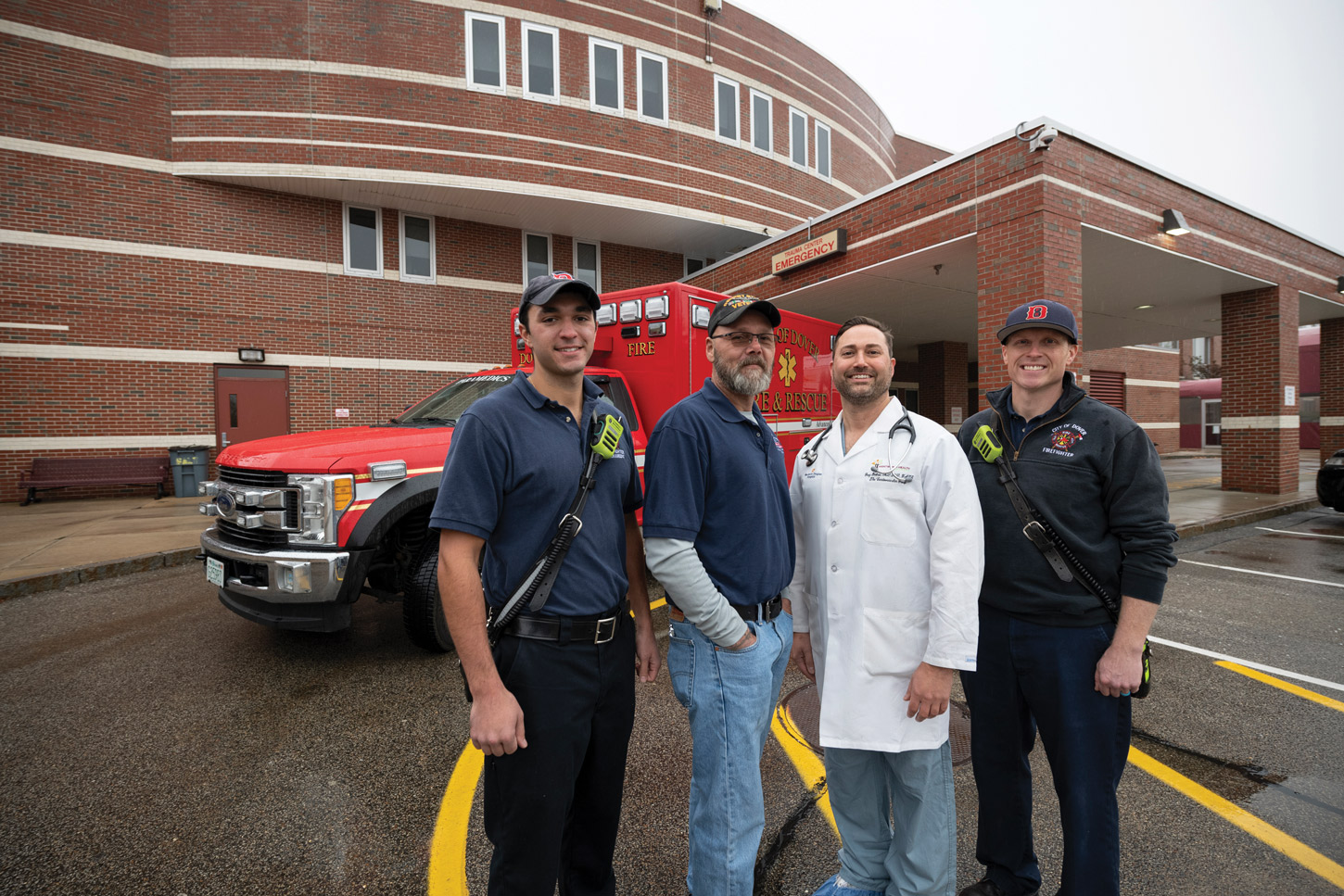01/21/2020
Jason's Story: Minutes Matter in Heart Attack Care
Jason Miller of Dover had a heart attack in June. In his 40s, Miller is active, not overweight, has no family history of cardiac problems and no issues with cholesterol or high blood pressure.
“This could have happened to anyone,” says Miller: “I work as a carpenter, and I had spent the day laying down a floor. At first, I thought I had pulled a muscle, but then I started feeling discomfort on both sides of my chest. So I left work early and drove north to Dover. By the time I made it through the Spaulding Turnpike toll booth, both of my arms were numb, and I had cold sweats and terrible nausea.”

Miller pulled his car over, called his wife, and dialed 911. Dover Fire and Rescue arrived at the scene and immediately began transmitting vital information to the Wentworth-Douglass Hospital Emergency Department, which activated a STEMI team.
STEMI (ST-Elevation Myocardial Infarction) is a true medical emergency. The most common symptoms are shortness of breath, nausea, and chest pain, which may travel from the chest into the shoulder, arm, neck or jaw, and last for more than a few minutes. One of the arteries that supplies oxygen and nutrient-rich blood to the heart muscle is blocked.
In Miller’s case, this blockage was a “complete and total occlusion.” An occlusion occurs when a coronary artery is closed or blocked off – a major cause of almost all heart attacks. Over time, a coronary artery can narrow from the build-up of various substances, including cholesterol (atherosclerosis) – a condition called coronary artery disease. During a heart attack, one of these plaques can rupture and spill cholesterol and other substances into the bloodstream. A blood clot forms at the site of the rupture. If large enough, the clot can completely block the flow of blood through the coronary artery.
All heart attacks are serious, but STEMI is among the most dangerous – in which a major artery to the heart is completely blocked – and is often referred to as a widow-maker heart attack.
Miller was transported to Wentworth-Douglass, and the STEMI Team was already in place when the ambulance arrived. He stayed on the stretcher (called a “hot stretcher”) and was brought immediately into the Cardiac Catheterization Lab.
He calls the rapid response and treatment he received “record breaking perfection.” It was just 23 minutes from his arrival at Wentworth-Douglass to the re-establishment of blood flow to his heart. According to Dr. Gregory A. Imbrie, Interventional Cardiologist, this speed is “the result of an amazing synergy between the EMS (Emergency Medical Services) team and the Hospital’s Cardiac Cath team. Because Wentworth-Douglass is full-service center, we have exceptional data on how rapid our response is, often called ‘door to device.’ In this case, it was 23 minutes. And what’s even more remarkable is that because of the thorough assessment the patient received from the Dover Fire and Rescue team – from the initial diagnosis, to the digital transmission to the hospital of the patient’s EKG results – we were able to immediately activate our STEMI team and stand ready to treat an acute heart attack.”
Miller’s blockage was cleared with a procedure called aspiration thrombectomy, along with the placement of a drug-eluting stent (a small mesh-like tube). According to Dr. Imbrie, “The patient received an advanced stent that is coated with a drug to help prevent re-blockage. Think of the artery as a cave that has given way and needs its sides reinforced, after we’ve cleared out all of the rocks and debris that were clogging it up in the first place.” The procedure was done using the heart attack care team’s trans-radial approach that provides radial artery access through the wrist and forearm.
Says Miller: “I was awake the whole time. The nurses were fantastic, keeping me alert and focused, while reassuring me that everything was going well. From the back of my knees up to my earlobes, I had felt severe cramping, such intense pain. As soon as the blockage was cleared, Dr. Imbrie said to me, ‘You should start feeling some relief now.’ Before he could even finish that sentence, I felt like someone had turned off the faucet, and the pain was just gone.”
According to Dr. Imbrie, the adage that “time is heart muscle” applies perfectly to Miller’s outcome: “He has no scarring, and he has completely preserved heart function. I remember his wife saying to me, ‘How could you be done? I just got off the phone with him.’ (The time from Miller’s first medical contact when EMS arrived at his car to the placement of the stent and restoration of blood flow at Wentworth-Douglass was 42 minutes.) And I have every reason to believe that our response times will only continue to improve.”
Says Miller: “It was truly a team effort, and I feel so grateful to the entire medical team and to my wife and family. The Cardiac Cath nurses came to visit me the next day, which was really touching. I feel amazing. My stamina is back and I can put in my usual 50-plus hours a week in carpentry work. I am one lucky guy.”
Expert Cardiac Care
We provide general cardiology services as well as device clinics and testing at two Wentworth Health Partners physician practices:
The Cardiovascular Group
(603) 516-4265
Cardiology at Pease
Wentworth-Douglass Hospital Portsmouth Outpatient Center
(603) 610-8070